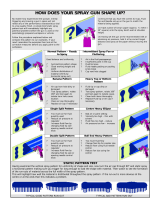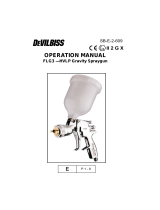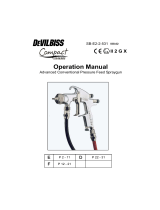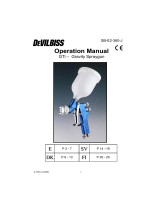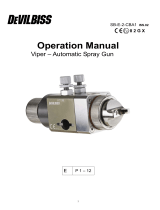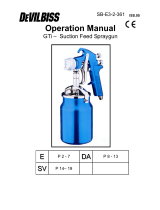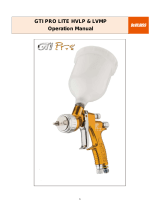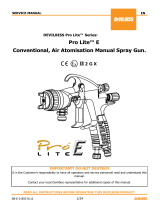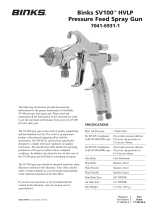Page is loading ...

SB-E-2-790 ISS.03
Operation Manual
FLG-G5-14
Transtech Gravity Spray Gun
E P 2 – 8

2 © 2003 ITW Finishing Systems and Products
E
Operation Manual
FLG5 – Gravity-feed Spray Gun
Important
Read and follow all instructions and Safety Precautions before using this
equipment
Description
The FLG5 gravity spray gun is fitted with a 1.4 mm nozzle for topcoat applications. Alternative
2.0mm nozzle and needles are available for primer use. The FLG5 gravity-feed spray gun is
approved to ATEX regulations 94/9/EC, protection level;
II 2 G X. Suitable for use in Zones 1 and 2
Important: These spray guns are suitable for use with both water-based and solvent-based
coating materials. The design uses EPA compliant atomising (Devilbiss Trans-Tech®)
technology to reduce overspray and improve coating efficiency. Nozzles and needles are
manufactured in stainless steel. These guns are not designed for use with highly corrosive
and/or abrasive materials and if used with such materials it must be expected that the need for
cleaning and/or replacement of parts will be increased. If there is any doubt regarding the
suitability of a specific material contact your local Distributor or ITW Finishing direct.
Specification
Air supply connection - Universal ¼” BSP and NPS
Maximum static air inlet pressure - P1 = 12 bar (175 psi)
Nominal gun inlet pressure with gun triggered - 2.4 bar (35 psi)
Maximum service temperature - 40°C
Gun weight - 640 g
Air flow - 277 l/min (9.8 cfm)
Materials of Construction
Gun body - Aluminium
Nozzle - Stainless steel
Needle - Stainless steel
Cup - Acetal and stainless steel
ITW Finishing Systems and Products reserve the right to modify equipment specification without prior notice.

© 2003 ITW Finishing Systems and Products 3
E
SAFETY WARNINGS
Fire and explosion
Solvents and coating materials can be highly flammable or combustible when sprayed.
ALWAYS refer to the coating material supplier’s instructions and COSHH sheets
before using this equipment.
Users must comply with all local and national codes of practice and insurance company
requirements governing ventilation, fire precautions, operation and house-keeping of
working areas.
This equipment, as supplied, is NOT suitable for use with Halogenated
Hydrocarbons.
Static electricity can be generated by fluid and/or air passing through hoses, by the
spraying process and by cleaning non-conductive parts with cloths. To prevent ignition
sources from static discharges, earth continuity must be maintained to the spray gun
and other metallic equipment used. It is essential to use conductive air and/or fluid
hoses.
Personal Protective Equipment
Toxic vapours – When sprayed, certain materials may be poisonous, create irritation or
be otherwise harmful to health. Always read all labels, safety data and follow any
recommendations sheets for the material before spraying. If in doubt, contact your
material supplier.
The use of respiratory protective equipment is recommended at all times. The type of
equipment must be compatible with the material being sprayed.
Always wear eye protection when spraying or cleaning the spray gun.
Gloves must be worn when spraying or cleaning the equipment.
Training – Personnel should be given adequate training in the safe use of spraying equipment.
Misuse
Never aim a spray gun at any part of the body.
Never exceed the max. recommended safe working pressure for the equipment.
The fitting of non-recommended or non-original spares may create hazards.
Before cleaning or maintenance, all pressure must be isolated and relieved from the equipment.
The product should be cleaned using a gun-washing machine. However, this equipment should
not be left inside gun-washing machines for prolonged periods of time.
Noise Levels
The A-weighted sound level of spray guns may exceed 85 dB (A) depending on the set-
up being used. Details of actual noise levels are available on request. It is
recommended that ear protection is worn at all times when spraying.
Operating
Spray equipment using high pressures may be subject to recoil forces. Under certain
circumstances, such forces could result in repetitive strain injury to the operator.

4 © 2003 ITW Finishing Systems and Products
E
Parts List
Ref. No Part Number Description Qty
1 SGK-0023 Retaining ring 1
2 FLG-0001-5 Air cap 1
3 SGK-0012-14
SGK-0012-20
Fluid tip 1.4mm
Fluid tip 2.0mm (available separately) 1
● 4 - Gasket 1
● 5 - Baffle 1
6 - Packing 1
7 - Packing gland nut 1
8 - Retaining ring 1
9 - Spray pattern adjustment valve bushing 1
10 - Spray pattern valve 1
11 - U-cup seal 2
12 - Air-valve seat 1
13 - Air-valve stem 1
14 - Air-valve spring 1
15 - Air-valve bushing 1
16 SGK-0414
SGK-0420
Fluid needle 1.4mm
Fluid needle 2.0mm (available separately) 1
17 - Fluid needle spring 1
18 - Fluid adjustment knob 1
19 - Nipple 1
20 - Retaining ring 1
21 - Air adjusting valve head 1
22 - Air adjusting valve assembly 1
23 - Retaining ring 1
24 - Trigger pin assembly 1
25 - Trigger 1
26 - Fluid nipple 1
28 KGP-5 Filter 1
29 GFC-402 Lid assembly 1
30 GFC-2-K5 Drip free vent lid kit of 5 1
31 GFC-501 Cup assembly 1
32 - Assembly tool 1
K-5040: Seal, baffle and gasket replacement kit, items 4, 5, 6, 11, 12, 13, 14, and 32
● K-5030: Baffle replacement kit, items 4 and 5.

© 2003 ITW Finishing Systems and Products 5
E

6 © 2003 ITW Finishing Systems and Products
E
Installation
Important: To ensure that this equipment reaches you in first class condition, protective coatings
have been used. Flush the equipment through with a suitable solvent before use.
1. Attach air hose to connector (19). Recommended hose size 8 mm bore. The hose must be
conductive and electrical bond from the spray gun to earth should be checked with an
ohmmeter. A resistance of less than 106Ω is recommended.
2. Air supply should be filtered and regulated.
Operation
1. Mix coating material to manufacturers instructions.
2. Turn needle adjusting screw (18) counter-clockwise until first thread shows.
3. Turn pattern valve (10) counter-clockwise to fully open.
4. Adjust inlet air pressure to give 2.4 bar (35 psi) at the gun inlet with the gun triggered. (pressure
gauge attachment shown under Accessories is recommended for this).
5. Test spray. If the finish is too dry, reduce air flow by reducing inlet pressure. If finish is too wet,
reduce fluid flow by turning needle screw (18) clockwise. If atomisation is too coarse, increase
inlet air pressure. If too fine, reduce inlet pressure.
6. The pattern size can be reduced by adjusting valve (10).
7. Hold gun perpendicular to surface being sprayed. Arcing or tilting may result in uneven coating.
8. The recommended spray distance is 150-200 mm (6”-8”).
9. Spray edges first. Overlap each stroke a minimum of 50%. Move gun at a constant speed.
10. Always turn off air supply and relieve pressure when gun is not in use.
Preventative Maintenance
1. Turn off air supply and relieve pressure in the airline or, if using QD system, disconnect from
airline.
2. Empty coating material into a suitable container and clean the gun and cup, preferably in a gun
wash machine.
3. IMPORTANT– the cup must not be cleaned or rubbed with a dry cloth or paper. It is
possible to generate a static charge by rubbing which, if discharged to an earthed object,
could create an incendive spark and cause solvent vapours to ignite. Only use a
dampened cloth or antistatic wipes if additional cleaning is required within a hazardous
area.
4. Remove air cap (2) and clean. If any of the holes in the cap are blocked with coating material,
only use the cleaning kit KK-4584 which has the correct tools for this (see Accessories) or, a
toothpick to clean. Using any other tool could damage the cap and produce distorted spray
patterns.
5. Ensure the tip of the nozzle is clean and free from damage. Build-up of dried paint can distort the
spray pattern.
6. Lubrication – Trigger stud (24), needle (16) and air-valve spindle (13) should be oiled each day.

© 2003 ITW Finishing Systems and Products 7
E
Replacement of Parts
Nozzle (3) and needle (16) – Remove parts in the following order: 18, 17, 16, 1, 2 and 3. Check
condition of nozzle seal (4) and replace if necessary. Replace any worn or damaged parts and
re-assemble in reverse order. Recommended tightening torque for nozzle (3) 16-20 Nm (150-
180 lbf in).
Packing – Remove parts 18, 17, 16. Unscrew packing nut (7). Remove packing (6). Fit new
packing (6) and nut (7). Re-assemble parts 16, 17, and 18 and tighten packing nut (7) with
spanner sufficient to seal but to allow free movement of needle. Lubricate with gun oil.
Air-valve Seal Kit K-5040
1. Remove adjusting knob (18), spring (17), and needle (16).
2. Loosen housing (15).
3. Remove housing (15) and air-valve spring (14).
4. Remove spindle (13).
5. Using service tool (32), engage groove behind the valve seat (12) and remove valve seat.
6. Push out the front air-valve seal (11).
7. Turn the gun upside down and let the seal fall out.
8. Fit new front seal (11) to service tool.
9. Fit new seal to gun body and press firmly to ensure seal is engaged.
10. Fit new valve seat (12) to service tool and fit valve seat into gun body.
11. Remove rear sir-valve seal (11) from housing (15) with a hooked instrument.
12. Fit new seal to service tool and fit deal to housing (15).
13. Replace spindle (13).
14. Replace valve spring (14), screw in housing (15) and tighten.
15. Screw reverse end of service tool into housing until fully engaged. Tighten by hand to seat
the valve seat. Remove tool.
16. Fit needle (16), spring (17) and knob (18).
17. Adjust needle packing (7) with spanner sufficient to seal but to allow free movement of
needle. Lubricate with gun oil.
Spreader valve (10) – Caution: always ensure that the valve is in the fully open position by
turning screw fully counter-clockwise before fitting to body.
Air cap / Nozzle selection
Refer to coating material manufacturers recommendations or ITW Finishing UK Website:
www.itweuropeanfinishing.com
Accessories
Cleaning brush – order 4900-5-1-K3
Pressure gauge attachment – order HAV-501
Digital pressure gauge – DGI-501-BAR
Lubricant – order GL-1-K10
Spray gun cleaning kit – KK-4584

8 © 2003 ITW Finishing Systems and Products
E
EC Declaration of Conformity
We, ITW Finishing UK, Ringwood Rd, Bournemouth, Dorset, BH11 9LH, UK, as the
Authorised Representative of the manufacturer of the Spray gun model FLG5, declare, under
our sole responsibility, that the equipment to which this document relates is in conformity with
the following standards or other normative documents:
BS EN 292-1 PARTS 1 & 2: 1991, BS EN 1953: 1999; and thereby conform to the
protection requirements of Council Directive 98/37/EC relating to Machinery Safety Directive,
and;
EN 13463-1:2001, council Directive 94/9/EC relating to Equipment and Protective
Systems intended for use in Potentially Explosive Atmospheres protection level II 2 GX.
This product also complies with the requirements of the EPA guidelines, PG6/34.
Transfer efficiency certificates are available on request.
B. Holt, General Manager
1st January 2006
ITW Finishing Systems and Products
Ringwood Road,
Bournemouth,
BH11 9LH,
England.
Tel. No. (01202) 571111
Telefax No. (01202) 581940,
Website address
http://www.itweuropeanfinishing.com
ITW Oberflächentechnik GmbH & Co.
KG
Justus-von-Liebig-Straße 31
63128 Dietzenbach
Tel (060 74) 403-1
Telefax: (060 74) 403300
Website address
http://www.itw-finishing.de
ITW Surfaces Et Finitions
163-171 avenue des Auréats B.P. 1453
26014 VALENCE CEDEX FRANCE
Tél. (33) 475-75-27-00
Télex 345 719F DVILBIS
Téléfax: (33) 475-75-27-99
ITW Finishing Systems and Products is a Division of ITW Ltd. Reg. Office:
Admiral House,
St Leonard’s Road,
Windsor,
Berkshire,
SL4 3BL,
UK
Registered in England: No 559693 Vat No 619 5461 24
/
